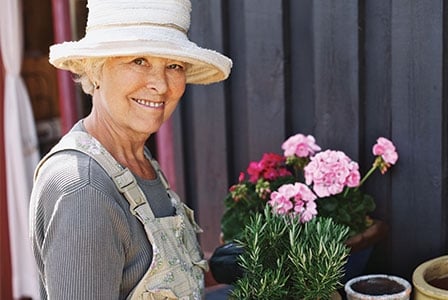
A landmark birthday or a first gray hair may remind us the clock is ticking. Luckily, there are many things we can do to age well.
There comes a point when the prospect of getting older strikes. A landmark birthday, a nostalgic moment, or a single grey hair could do it. Aging is inevitable, but slowing down is not. By maintaining our health and vitality, we can enjoy growing old and the unique opportunities to come.
The fact is, we’re all getting old—older that is, with average life expectancy increasing year after year thanks to advances in medicine and healthier lifestyles. Baby boomers are hitting their senior years, creating a growing tide of older adults across the country. Today, over 15 percent of Canadians are aged 65 years or more, and centenarians are among the fastest-growing age groups across the country.
Benefits of being old
Longer, healthier lifespans bring many advantages and opportunities. Not least is the luxury of time. Dr. Samir Sinha, director of geriatrics for Mount Sinai and University Health Network Hospitals, suggests that “people now enter the ‘third age’—a period after retirement—when there is huge opportunity to travel, pursue a new degree, enjoy hobbies, learn new things, and spend more time with family.”
A wealth of experience helps steer new life goals while keeping things in perspective. Older age is linked to emotional stability and positive mood—helping us enjoy every moment. “We age with a lot of experience,” says Sinha, “and after all the ups and downs, older adults tend to have a much better outlook on life.”
Take action early
Alongside the many benefits of growing old come physical, social, and psychological changes that challenge our quality of life. According to Sinha, “The key is recognizing that as we age our bodies become naturally weaker and more frail—but there are things we can do to combat this.”
Distinguishing the natural signs of aging from illness, and making healthy choices across the lifespan that help maintain or even improve health, is vital to fulfilling our golden years.
Surface changes
For many, changes in appearance are often the first notable signs of aging. Going grey is a common side effect, but skin also takes on a new look. A slower rate of turnover in epidermal cells—from 28 days in the young to up to 60 days in the elderly—causes skin to appear translucent. Fewer pigmenting cells, called melanocytes, can result in mottling, freckles, and lentigines (benign, small, pigmented, flat or slightly raised spots).
Take action: These changes are harmless, but leave us less protected against skin cancer. Simple steps to keep healthy include year-round UV protection and regular self-checks for abnormally discoloured patches or spots, or changes to the colour, size, or shape of a mole.
Better bones
Overt signs of aging are hard to ignore, but some of the earliest and most important changes are invisible to the eye. As young as 25 years, bone density reaches its peak and from the mid-30s gradually begins to decline.
Osteoporosis—and a high risk of hip, wrist, and spinal fractures—is most common among women, but also affects men.
Take action: Include calcium- and magnesium-rich foods in your diet, such as spinach, soy, and dairy. Gentle weight-bearing exercise is best for bone building. If lifting barbells isn’t for you, try walking, jogging, Pilates, or resistance bands for a solid skeletal workout.
Maintaining muscle
Muscle mass reduces with age, and as a result so does strength and coordination. If left unchecked, these changes can lead to difficulty with everyday tasks, such as household chores, shopping, and even just getting around.
Take action: Training with light weights or resistance bands can boost strength, while tai chi is a great way to keep your balance in check. To support muscle repair and growth, ensure up to 10 percent of calories in your diet come from healthy proteins, such as legumes, lean meats, and fresh fish.
Young at heart
Our most important muscle is the heart. Aging leads to thickened ventricle walls and weaker contractions—making every heartbeat harder work over time. Day-to-day, the healthy aging heart is not a hindrance. But added stress resulting from high blood pressure, cholesterol, or weight gain—common age-related health issues—compounds the problem.
Take action: At least 150 minutes per week of moderate to vigorous aerobic activity—such as brisk walking, cycling, or swimming—can prevent heart disease. Swap high-calorie and highly salted processed foods for a Mediterranean diet of unprocessed fruit and vegetables, fatty acids from well-sourced fish, and complex carbohydrates.
Mind your brain
Our brain is always evolving, but begins to decrease in size by as much as 1 percent per year in healthy adults. Changes to the network of nerve cells—called neurons—which transmit messages between the brain, spinal cord, and central nervous system, have the greatest impact.
Processing speeds, episodic memory, decision making, and problem solving will naturally slow. Forgetting a name or misplacing your glasses is typical at any age, and no cause for worry. Instead, difficulty forming new, recent memories is a common sign of illness, including Alzheimer’s.
Take action: Stay sharp with hobbies such as problem-solving puzzles, reading, and creative writing. Get a board game out when the family gathers, or play solitaire in your free time. Learn a language or musical instrument—the key is to keep challenging your mind.
Explaining aging— new theories
We haven’t discovered the fountain of youth, but scientists are quickly unravelling other sources of good health and long life. “There are a lot of promising theories and ideas out there,” says Sinha, “but none that we’ve been able to say with strong evidence explains aging. Overall, we realize that there are many components contributing to the process.”
While there is no clear agreement, science is focused on two broad areas: genetically programmed processes contributing to aging, and the result of cumulative damage to the body.
Silencing senescence
Our DNA contains specific genes that support development and protect against illness. From birth, round-the-clock DNA activity becomes more efficient through a process called methylation, which blocks—or silences—specific genes no longer needed for growth. Today, scientists are developing and exploring molecular substances that could reactivate protective genes that are essential for our health.
Telomere tails
Telomerase, an enzyme found in germ, cancer, and stem cells, is another key to genetic aging currently being explored for its potential to protect against disease and extend life. Each time a cell divides, the protective end of the DNA chromosome, called a telomere, is shortened. Telomerase repairs and replaces frayed DNA ends, increasing the life of a cell.
Antiaging antioxidants
Free radicals are essential to everyday function: their imbalance of electrons create electrical pulses that provide energy, maintain immunity, put hormones to use, or contract muscles. But over time, they can build up to toxic levels and take their toll. The most common age-related illnesses, including heart disease, cancer, and dementia, can be traced back to DNA damage generated by free radicals.
Antioxidants repair DNA by reducing inflammation and oxidation. Cells produce antioxidants naturally, providing a built-in system of oxidative stress resistance. Regular exercise and a healthy diet, including key vitamins such as B12, folic acid, A, C, D, and E, are additional buffers.
Myth busting
Understanding molecular processes of aging is an obstacle for scientists—adjusting to everyday physical and functional changes is the challenge for the rest of us.
“There are a lot of different notions about aging, and a lot of misinformation out there,” suggests Sinha. “For people trying to understand the aging process, or understand what that will look like for them, having the right information will help make the best decisions about how they approach living in later life in particular.”
We can be certain of the impact on our well-being down the road of a healthy diet, physical activity, and not smoking.
Fasting for life
Reduced calorie intake—through intermittent fasting or calorie restriction of up to 30 percent of a recommended diet—can have dramatic effects on longevity. Popular today for its weight-loss potential, this type of dieting has important potential for countering aging.
Fasting impacts nutrient-sensing pathways, improves hormonal adaptations, reduces cellular damage and autophagy, and minimizes inflammation and immune aging—reducing risk of chronic illnesses such as cancer and heart disease.
Everything in moderation
Maintaining nutrient intake during a low-calorie diet is crucial, leaving no room for empty calories. Whether fasting or not, a balanced, healthy diet is essential to longevity. “Our diets tend to be fat laden, with a lot more processed food, salts, and excessive things we don’t need and often not enough of what we do need,” suggests Sinha.
Some foods are better linked to healthy aging than others, but there’s no magic bean for keeping us around. According to Sinha, “There is evidence out there, for example, that eating some chocolate will help you live longer. But you shouldn’t therefore eat a kilogram of chocolate every day. Everything in moderation is the key to moving forward.”
Activity is key
People who are physically active live longest and enjoy better health in their older years. Regular aerobic and resistance exercise protects against heart disease—a leading cause of death—as well as high blood pressure, stroke, diabetes, obesity, osteoporosis, and some forms of cancer. Boost overall activity levels through housework, gardening, and daily errands.
Keeping connected
Staying social is another key to a long and happy life. A range of social ties and hobbies is important to emotional wellness, happiness, and life satisfaction—but also benefits our physical health, decreasing our risk of cancer and cardiovascular disease and improving cognitive functioning.
“People who are very social, but have no remaining family or friends, can become very isolated and lonely, and that can certainly impact their health,” warns Sinha. Local libraries and community centres are good starting points for getting involved, and volunteering can open opportunities to increase your sense of belonging while forming friendships.
Looking forward
Despite the changes and challenges of aging, there is plenty to look forward to. Preventing chronic illness is key, but embracing healthy change is just as important as we age—so we can start looking forward to tomorrow, today.
Top tips for healthy aging
- Protect skin year- round from harmful UV radiation.
- Stay strong with up to 10 percent of your daily calories from protein.
- Aim for seven to eight hours of sleep each night.
- Drink less alcohol and choose red wine and good quality beer for their polyphenols.
- Avoid hazardous air pollutants, including cigarette smoke.
- Correct age-related deficits—have your vision and hearing checked regularly.
- Volunteer in your community to stay active and social.
Foods for the long haul
| Food | Benefit |
| chia seeds | rich in alpha-linolenic acid, just 25 g per day may reduce inflammation |
| tea | green or black—but best taken with milk to help polyphenol absorption |
| extra-virgin olive oil | polyphenols and monounsaturated fats keep the heart healthy |
| beet concentrate | a natural source of nitrous oxide for healthy blood vessels and circulation |
| onions | a top source of quercetin, an antioxidant and anti-inflammatory—best eaten raw |
| fish | sustainably sourced fatty fish (salmon, lake trout, herring, sardines, tuna) are rich in omega-3 fatty acids, keeping cholesterol in check |
| raw fruit and vegetables | flavonoids, the major colouring component of plants, sweep up free radicals—but are easily lost with cooking |
| red wine | high in resveratrol and catechins, a glass a day can slow cellular aging, protect against cancer, and boost cardiovascular health |
| blueberries | anthocyanins support balance and coordination, keeping mobility up |
Supplements for seniors
| Benefit | Supplements |
| strength | leucine-enriched amino acid, vitamin D, creatine, whey, or milk protein |
| eyesight | beta carotene, lutein, zinc sulphate, zeaxanthin |
| bone | soy isoflavone, calcium, magnesium, vitamin D |
| muscle | omega-3 fatty acids, huperzine A, folate, vitamin B12 |
| skin | topical vitamin C, kinetin |
| heart | vitamin D; fish oil; vitamins C, B6, and B12 |
| gut | probiotics |



